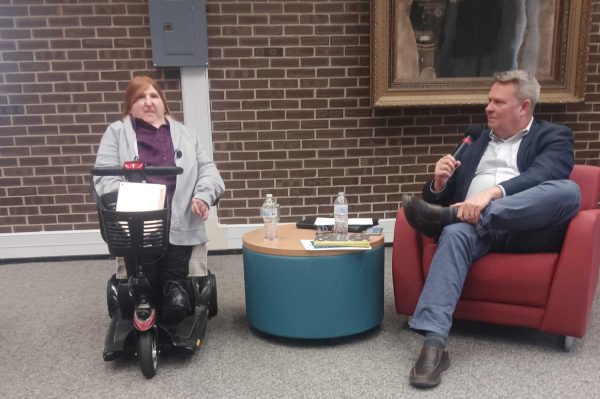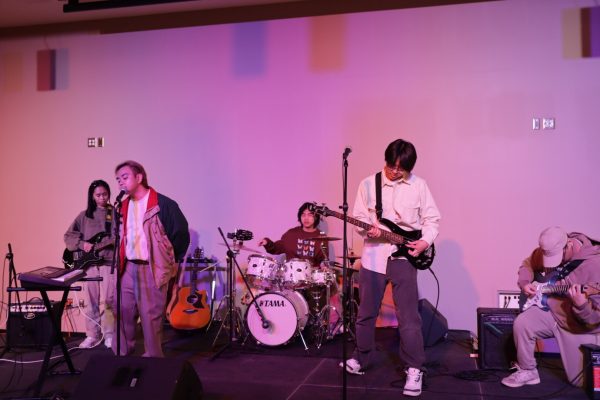Free theater offers education, entertainment
November 16, 2006
David Rauch is a Northern Star employee studying abroad. “An American In Paris” will chronicle his studies and adventures in France.
The theater lights dim right on time, catching some people still looking for seats in the packed theater. It’s a Sunday night, though it could be any other; every night, weekday or weekend, the seats are filled.
It is a Frederick Wiseman festival all month long here. He’s a lone American documentary maker from the sixties who presents looks into a mostly American culture with exhausting clarity and comedy.
“Here” is the Centre Pompidou, the giant architectural feat turned inside-out in the center of Paris.
It’s the only Parisian attraction on my metro line 11 that houses the museum of modern art, the only convenient free public library, giant installation spaces and — in the interest of this article — two theater rooms acting as additional screens for the renowned Cinemateque Francais. This is an organization for the distribution and education of world, fringe, experimental and forgotten cinema.
Its existence might have been one of the reasons I came to Paris to begin with. By now addicted to Netflix and eager to share that obsession with others in a real theater, I was no longer alone in the NIU library viewing room or at home. But when I arrived and went to the Cinemateque building proper, on the other side of town in a wild Frank Gehry building, one could only buy whole year unlimited passes for 120 euros. Not something I could justify for only one-third of the membership — four months that I would spend in Paris.
The same goes with all the theaters that claim cheap monthly passes in Paris.
You have to buy them for the whole year at once — or so I thought.
I did the math, and even if I went once every other day, tickets would still equal almost 3 dollars a piece. For a cheapskate, too much, and anyway, I would be out 120 euros.
Then I found the Centre Pompidou.
When a museum is largely state-funded, like Pompidou and unlike the private-funded Cinemateque, ticket prices drop. This happens all around Paris, a city maddeningly devoted to supporting the arts.
A year-long pass to the entire museum, not just the two theaters inside, was a simple 20 euros for a student.
Finding this changed things for me in Paris. It is the only place where, in the second floor cafe and smoky outdoor space, there is a consistent flow of friendly and interesting Parisian students who will talk to a foreigner. However only if his scarf is long enough, bright green enough and worn with pink Puma shoes. Anyway, it is a start to feeling accepted. Otherwise, it acts as a guarantee, never a guess, never a night wasted.
Every night, there will be a film I have never heard of about a subject I know nothing about. A couple weeks ago, there was an entire two-hour festival on short animation clips involving sand. The theater was packed.
Three weeks ago, they brought in a documentary film director and showed her, I suppose, mediocre short movies. Half the theater, unimpressed, walked out, bowing out and giving a wave to the director in the first row.
It is a tough crowd, and I had never seen that kind of treatment before, and the films were not even that bad.
However, the Wiseman Festival keeps people in their comfortable, plush chairs. I never thought I would see a packed house — in France, on a weekday — for an obscure American documentary film from the ‘60s.
After that first film, though, like the Parisians, I was hooked.
Something about his piercing objectivity, fairness and truly exhaustive examination of predominantly American everyday lives struck a chord with me… and the others together in the theater.
I find myself there every night, in fact, and what a strange way to spend my time in Paris, right? Watching documentaries on Aspen, Colo. or the Sinai Field Mission.
However, it has become part of my education in Paris.
Along with living in the Muslim/Jewish/Chinese/French part of town, studying contemporary French literature and film classes, playing Indian and Algerian folk music with street performers in the metro. I take trips to ancient and aristocratic chateaus. I live with a French family. I play wild ultimate Frisbee matches while stranded in airports for the night and replaced my language for another.
Watching these films might perhaps be the ideal thing to do in Paris. These are films I would never have seen in America, glimpses America never afforded me, cities I have never seen.
In fact, how much different are these expert presentations of a city in two hours unlike my unprofessional four month stay in Paris? In the end, they feel the same — not that I was there, but I felt like I was there.
I think I see a little jealousy in the Parisians when they watch the films.
I think they wish someone would have documented and pored over pieces of culture for them too.
I think when they walk out of the theater, they have to compare what they saw to what they think about Paris.
At least I know I do.
Au revoir,
David










